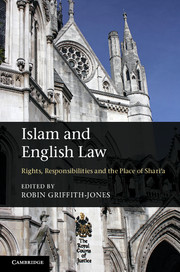Book contents
- Frontmatter
- Contents
- List of contributors
- List of abbreviations
- Preface
- Introduction
- Part I The Archbishop of Canterbury and shariʽa law
- Part II The Archbishop’s proposal for ‘transformative accommodation’
- Part III Responsibilities and rights
- Freedom of speech, incitement to religious hatred: beyond the divide?
- 13 Where to draw the line, and how to draw it
- 14 Censor or censure: maintaining civility
- 15 In praise of ‘fuzzy law’
- Religion, the state and the meaning of ‘jihad’
- Part IV Prospect: equality before God and before the law
- Select bibliography
- Index of cases
- Index
- References
14 - Censor or censure: maintaining civility
Published online by Cambridge University Press: 05 April 2013
- Frontmatter
- Contents
- List of contributors
- List of abbreviations
- Preface
- Introduction
- Part I The Archbishop of Canterbury and shariʽa law
- Part II The Archbishop’s proposal for ‘transformative accommodation’
- Part III Responsibilities and rights
- Freedom of speech, incitement to religious hatred: beyond the divide?
- 13 Where to draw the line, and how to draw it
- 14 Censor or censure: maintaining civility
- 15 In praise of ‘fuzzy law’
- Religion, the state and the meaning of ‘jihad’
- Part IV Prospect: equality before God and before the law
- Select bibliography
- Index of cases
- Index
- References
Summary
In discussion of free speech and incitement to religious hatred there is a tendency to draw an analogy with blasphemy. This becomes the point of departure or more than the point of departure. But I want to suggest that a better analogy, as a starting-point, is incitement to racial hatred or (in a slightly different but related challenge) the legal and other issues around Holocaust-denial.
Clearly there is sometimes a public order concern about the forms of dangerous speech that incite hatred. We recognise occasions on which the law has to intervene to stop people saying certain things or things in a certain way or saying those things in a certain time and place. For a classic illustration used by political theorists and others, take a situation in which there is a threat of immediate violence. Such a case is sketched by John Stuart Mill in On Liberty. He is championing freedom of speech but he says:
even opinions lose their immunity, when the circumstances in which they are expressed are such as to constitute their expression a positive instigation to some mischievous act. An opinion that corn-dealers are starvers of the poor, or that private property is robbery, ought to be unmolested when simply circulated through the press, but may justly incur punishment when delivered orally to an excited mob assembled before the house of a corn-dealer, or when handed about among the same mob in the form of a placard.
- Type
- Chapter
- Information
- Islam and English LawRights, Responsibilities and the Place of Shari'a, pp. 216 - 224Publisher: Cambridge University PressPrint publication year: 2013
References
- 1
- Cited by

